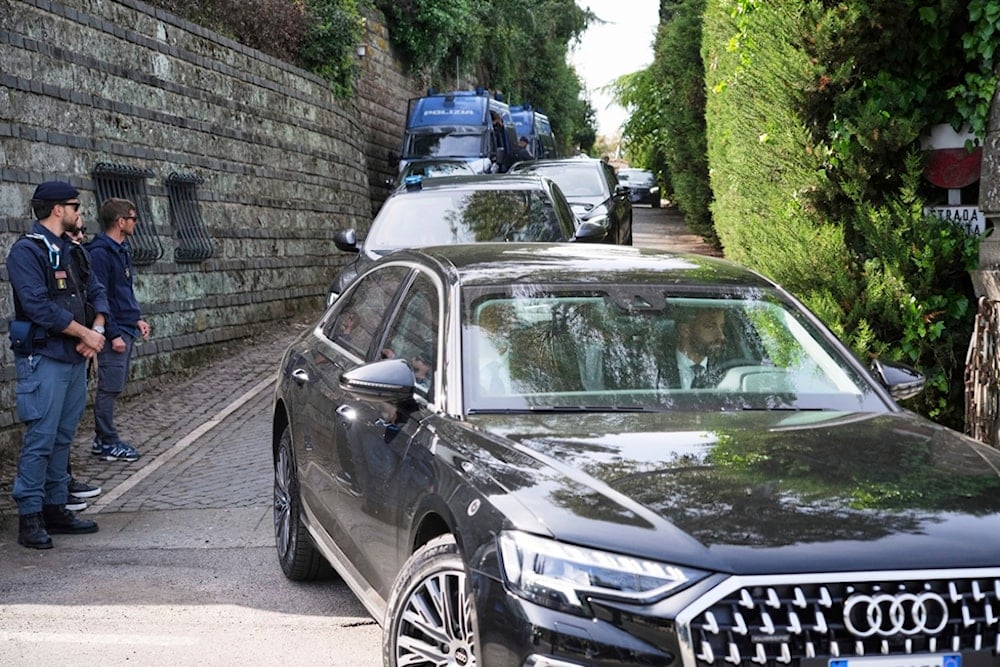Fourth round of Iran-US talks to be held on May 11 in Oman
The fourth round of indirect nuclear talks between Iran and the US will take place in Muscat on Saturday, after being postponed earlier.
-

Iranian delegates leave the Omani Embassy in Rome after a closed-door meeting with a US delegation to discuss Tehran's nuclear program, Saturday, April 19, 2025. (AP)
The fourth round of talks between Iran and the US on Iran's nuclear program will be held in the Omani capital of Muscat on May 11, Iran's Nour News agency reported on Tuesday, citing sources.
"The fourth round of indirect talks between Iran and the US will be held in Muscat" on Sunday, May 11, the source told the news agency.
Earlier, Israeli journalist Barak Ravid said US President Donald Trump's senior advisor and Middle East envoy, Steve Witkoff, told him Washington was trying to schedule the fourth round of talks for this weekend.
🚨🇺🇸🇮🇷White House envoy @SteveWitkoff told me the U.S. is trying to schedule the fourth round of nuclear talks with Iran for this weekend. "If it doesn’t happen it’s only because of the president’s trip to the Middle East," he said
— Barak Ravid (@BarakRavid) May 5, 2025
"If it doesn’t happen it’s only because of the president’s trip to the Middle East," Witkoff said, as quoted by Ravid.
According to the Israeli journalist, the US envoy described the nuclear talks with Iran as "positive".
"We are making some progress. I hope it is moving in the right direction. The president [Trump] wants to see this solved diplomatically if possible, so we’re doing everything we can to get it going," Witkoff said.
The latest remarks come amid a pause in diplomatic engagement, following recent developments regarding Iran’s nuclear file and Western positions.
The fourth round of talks was initially scheduled for May 3 in Rome. However, it was postponed.
Iranian sources told Al Mayadeen that the postponement came in light of the conflicting positions taken by the US administration regarding the talks.
They added that the postponement was due to Washington’s attempt to alter the general framework of the talks, which had been previously agreed upon.
The announcement came shortly after the US imposed new sanctions on entities accused of participating in the illicit trade of Iranian oil and petrochemicals.
Renewed diplomacy
Since April 12, Tehran and Washington have engaged in three rounds of dialogue, the most significant contact on the nuclear issue since Trump’s 2018 withdrawal from the Joint Comprehensive Plan of Action (JCPOA).
These recent talks were initiated after Trump sent a letter to Iran’s Leader Sayyed Ali Khamenei, in March, calling for renewed discussions while simultaneously warning of potential military action if diplomacy did not succeed.
The tension surrounding Iran’s nuclear program has intensified since the US exit from the JCPOA, which had provided Tehran with sanctions relief in exchange for limiting its nuclear activities.
Iran remained in compliance for a year following the withdrawal but gradually began scaling back its commitments. Western governments have accused Iran of attempting to develop nuclear weapons, an allegation Tehran firmly rejects. Iran has confirmed over and over again that the country’s nuclear program is strictly for peaceful, civilian purposes.
Iran defends right to uranium enrichment under NPT
Iran has reaffirmed its right to enrich uranium under the Nuclear Non-Proliferation Treaty (NPT), amid renewed Western concerns over its nuclear intentions and delayed talks with the United States.
Foreign Minister Abbas Araghchi stated Saturday in a post on X that “Iran has every right to possess the full nuclear fuel cycle,” citing Tehran’s long-standing NPT membership.
He emphasized that multiple countries enrich uranium while rejecting nuclear weapons development, implying Iran should be afforded the same recognition.
I generally refrain from airing arguments on key negotiation elements through the media.
— Seyed Abbas Araghchi (@araghchi) May 2, 2025
What I will say is that repeating falsehoods will not change basic facts. As a founding signatory to the NPT, Iran has every right to possess the full nuclear fuel cycle. Moreover, there…
Under the NPT, signatory countries are allowed to pursue peaceful nuclear programs, provided that they declare their nuclear materials and activities to the International Atomic Energy Agency (IAEA) for monitoring.
Tehran has consistently denied accusations from the US and European countries that it seeks to develop nuclear weapons.
Iran currently enriches uranium to 60% purity, far above the 3.67% limit set in the 2015 nuclear deal, but still below the 90% level needed for weapons-grade material.
In a recent interview for Fox News, US Secretary of State Marco Rubio criticized Iran’s enrichment activities, stating that “the only countries in the world that enrich uranium are the ones that have nuclear weapons.”
He called on Tehran to halt its program and allow international and US inspections of its nuclear facilities.
Iran has dismissed calls for international inspections and potential sanctions, labeling such pressure as politically motivated.
Araghchi reiterated that Iran’s uranium enrichment rights are non-negotiable and denounced Western accusations as unfounded.
Read more: Diplomatic sources deny US reports about details of Iran-US deal

 4 Min Read
4 Min Read








